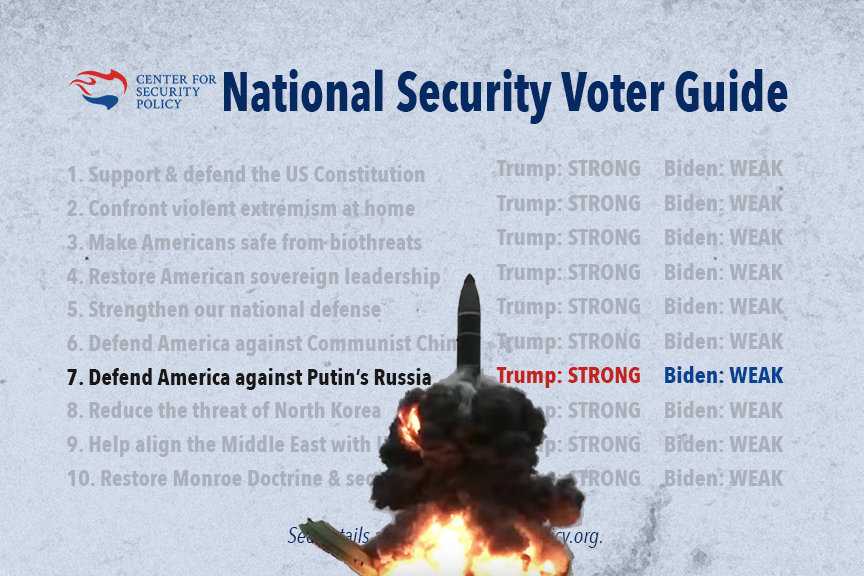National security rating #7: Defend America against Putin’s Russia

Russia policy has been a volatile issue since the 2016 election cycle, when Democrat presidential nominee Hillary Clinton accused Donald Trump of “collusion” with the Kremlin. That allegation set off a chain of events that led to Trump’s impeachment, yet were found to be specious and fabricated.
Item #7 on the Center for Security Policy’s 2020 National Security Voter Guide is how each candidate would defend America against the Putin regime in Russia.
Russia under Vladimir Putin remains important thanks to the country’s vast, modernized strategic nuclear weapons arsenal. That arsenal, with more modern nuclear warheads, ICBMs, and other platforms than the US, presents an existential threat to America (see illustration of 2019 Russian ICBM test launch). The Putin regime is a gangster state, with powerful internal security and foreign intelligence services still built upon the old Soviet KGB, and a revived GRU military intelligence service that is now heavily engaged in offensive political intelligence against the US and its allies. Russia continues to supply rogue regimes including Iran. And it interferes in America’s politics as it has since the 1920s, exploiting our political, cultural, and social differences to turn us against one another.
We assess each candidate’s position on defense against Russia on several criteria: supporting or opposing Putin’s regime; policies toward Russia’s strategic nuclear weapons modernization programs and defense against Russian missiles; policies affecting the Putin-dominated economy; helping Russia’s threatened neighbors defend their sovereignty without US entanglements; blunting destructive interference in areas of US interest; strengthening of FBI counterintelligence against Russian espionage offensives; and preventing Moscow from interfering in American internal affairs.
Joe Biden. In the Senate, Joe Biden took a rather benign view toward Moscow. He was considered soft toward the USSR and did not distinguish himself with trying to help it collapse during the Reagan years. After the Soviet collapse, he became a top proponent of massive US aid programs that led – as current Center staff warned at the time – to the creation of the KGB/gangster-state that it has become under Putin. Biden supported Putin’s rule at first in the early 2000s, then backed away to support Putin’s powerless opposition. Biden raised few issues over the past 30 years about Russia’s strategic nuclear modernization, and indeed voted to subsidize it with US tax dollars under an arms-control rubric. As vice president he supported Russia’s western neighbor Ukraine, where his son landed a million-dollar-a-year position with a Russia-connected Ukrainian gas company as part of an influence operation aimed at the Obama administration. But he opposed sending lethal aid to help Ukraine’s defense. The Obama team knew since 2014 that Russia was trying to subvert US elections but did nothing until late 2016. Over the past several years, Biden has been rhetorically tough against Putin and supportive of his internal opposition, and supported Magnitsky sanctions against Putin-allied oligarchs. He opposes defenses to shoot down Russian missiles aimed at the United States and has broken with Obama to embrace a “no first use” nuclear weapons policy.
Donald Trump. On Russia, it has been a matter of what Trump does, not what he says. Trump has hemmed in Putin and by enforcing Magnitsky sanctions, and imposed further sanctions for Moscow’s attempted murder of Sergei Skripal in the UK, a former Russian double agent ransomed in a 2010 spy swap. He named a hawkish arms control chief to cut Russian strategic weapons advantages, while modernizing America’s outmoded strategic weapons and building advanced missile defense systems that Biden opposed. While strengthening NATO in a forceful way to make each ally pay its commitment to the alliance, Trump has sought to deprive the Kremlin of foreign exchange from gas revenue from the Nordstream-2 pipeline to Germany. He enlisted Middle Eastern cooperation to force Moscow to subsidize its gas exports, while he promoted cheaper American gas exports. He sent lethal aid to help Ukraine defend itself from Russia. He has worked to push Kremlin influence out of the Middle East, Africa, and Latin America. Since 2017 he has implemented policies to prevent Russian interference in US elections and challenge “malign activities.”
Defend against Putin’s Russia verdict – Trump: Strong. Biden: Weak.
- Chinese spies ‘sham marriage’ scandal exposes ‘targeted’ national security threat at major US base: Waller - January 27, 2026
- The “Donroe Doctrine” In Action - January 7, 2026
- Is Cuba Ready to Fall? - January 7, 2026
